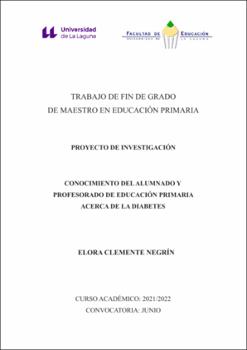Conocimiento del alumnado y profesorado de educación primaria acerca de la diabetes.
Author
Clemente Negrín, EloraDate
2022Abstract
La diabetes es una de las enfermedades más comunes en la edad escolar. Para el alumnado
diabético como para su familia, el hecho de encontrarse ante un nuevo mundo al que tienen
que adaptarse es bastante complejo. Un aspecto de suma importancia y que pocos tienen en
cuenta es el momento en el que ese escolar vuelve al colegio, ante esa situación ya el niño o
niña no cuenta con el respaldo de sus padres, sino que son los docentes y sus compañeros
quienes pasan a ser el apoyo del diabético ante cualquier situación compleja de la
enfermedad. Con respecto a los maestros y maestras, ¿sabrán estos tratar la enfermedad lo
mejor posible? ¿Conocerán cómo actuar ante cualquier situación compleja? y los alumnos,
¿sabrán qué hacer ante una situación de bajada o subida de azúcar?
El objetivo de esta investigación es conocer cuál es el conocimiento que tienen los docentes y
el alumnado de educación primaria con respecto a la diabetes, para poder comprobar si se
puede garantizar un lugar seguro a los escolares que padecen esta enfermedad.
Este estudio se ha realizado en el tercer trimestre del curso académico 2021-2022 en un
colegio del sur de la isla de Tenerife, concretamente en el municipio de Arona. Se le realizó
la investigación a través de dos cuestionarios a un total de 42 docentes y 147 alumnos.
El análisis de los resultados muestra que existe por gran parte de los agentes un
desconocimiento total de la enfermedad, con respecto a síntomas, causas, actuaciones para
ayudar, etc. Cabe destacar que los docentes y alumnos no tienen la obligación de estar
formados ante todas las afecciones que pueda haber en el aula, pero sí tener un mínimo
conocimiento de ellas, para poder crear un ambiente de normalidad y seguridad para los
alumnos que las padezcan. Diabetes is one of the most common diseases in school age. For diabetic students as well as
for their family, the fact of being faced with a new world to which they have to adapt is quite
complex. An aspect of great importance and that few take into account is the moment in which that students returns to school, in that situation the child does not have the support of
his parents, but it is the teachers and his classmates who become the support of the diabetic in
any complex situation of the disease. With regard to teachers, will they know how to treat the
disease as best as possible? Will they know how to act in any complex situation? and will the
students know what to do in a situation of low or high sugar?
The objective of this research is to know what is the knowledge that teachers and students of
primary education have regarding diabetes, in order to check if a safe place can be guaranteed
to schoolchildren suffering from this disease. This study has been carried out in the third
quarter of the academic year 2021-2022 in a school in the south of the island of Tenerife,
specifically in the municipality of Arona. The research was carried out through two
questionnaires to a total of 42 teachers and 147 students.
The analysis of the results shows that there is a total lack of knowledge of the disease by a
large part of the agents, with respect to symptoms, causes, actions to help, etc. It should be
noted that teachers and students do not have the obligation to be trained in all the conditions
that may exist in the classroom, but to have a minimum knowledge of them, in order to create
an environment of normality and safety for the students who suffer from them.





